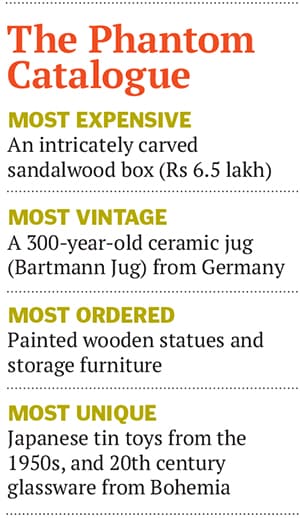Online Antique Seller Phantom Hands Receives Angel Funding to Expand
The startup has a unique proposition of selling antiques and vintage products. It will add two products per day and also get into newer categories


A range of unique antiques—from 1940s’ metal lamps and century-old wooden statues of Hanuman and Garuda to art deco tables— adorn Bangalore-based couple Deepak Srinath and Aparna Rao’s living room. For over a decade, collecting antiques has been a hobby for them, which they turned into a business venture in June 2013 with Phantom Hands—India’s first online store for antiques and vintage products.
The year-old company, which clocks monthly revenues of Rs 8-10 lakh, raised an undisclosed capital this August from four angel investors that include Google India head Rajan Anandan and Rehan Khan, head of a pharma company The others funding it are Ravi Shah, director of Mumbai-based design firm Mind’s Eye Creative, and Amit Malik, a London-based psychiatrist.
Phantom, which stocks 150 products at present, plans to use the capital to expand. It will add two products per day and also get into newer categories. “Our aim is to have categories from furniture to vintage cars and bikes,” says Srinath. Vintage watches, pens and other collectibles will also be retailed soon.
Comparisons with America’s popular online antique seller, 1stdibs, may be far-fetched but necessary. 1stdibs launched in the US in 2003 and now earns revenues of over $650 million. It retails antiques from furniture and fine art to jewellery and watches.“Why can’t it be India’s Istdibs?” asks investor Rehan Khan. “The company [Phantom] is adding new categories. They sell high quality, ethical products [and] not reproductions. And the sourcing is impeccable.” Khan believes it will evolve into something more than just a retail transaction website.
Unlike most ecomm-erce firms that struggle to break even, Phantom says it has been profitable from the start. It ships products in India and the US, with nearly a third of its sales happening overseas. Products range from Rs 12,500 to a few lakhs, and the average ticket price is Rs 40,000.
Its business model is simple: Rao and Srinath have stitched partnerships with antique dealers in South India and Gujarat. Products are sourced from them, authenticated by a set of experts, and listed on the website. Each product featured on the site has details including the period in history it belongs to, its provenance, condition, dimensions and of course, price.
“Antiques are not just old products. There are fascinating stories behind them and that’s what leads people to buy them,” says Srinath, who in his earlier role as an investment banker helped ecommerce companies raise capital. His wife, Rao, is an installation artist.
Why Phantom Hands?
Says Srinath, “We realised that we couldn’t possibly buy and possess all objects we admire, and therefore hit upon the idea of Phantom Hands as a means of staying involved, and engaging with these objects over a continued period of time.”
First Published: Sep 06, 2014, 06:55
Subscribe Now